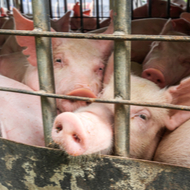
Measures include a ban on live animal exports for slaughter and the introduction of compulsory microchippping of cats
The government has today (12 May) published the UK's first-ever Action Plan for Animal Welfare, setting out how it will better protect the welfare and conservation of animals both here and overseas.
Launched by environment secretary George Eustice, the plan will formally see animals recognised as sentient beings in UK law and includes a range of measures to protect the welfare of pets, livestock and creatures in the wild.
Among the measures include prohibiting live animal exports for slaughter and fattening and a ban on keeping primates as pets.
Mr Eustice said: “We are a nation of animal lovers and were the first country in the world to pass animal welfare laws. Our Action Plan for Animal Welfare will deliver on our manifesto commitment to ban the export of live animal exports for slaughter and fattening, prohibit keeping primates as pets and bring in new laws to tackle puppy smuggling.
“We will lead on the protection of animals abroad by implementing the world’s toughest ivory ban and banning the import of hunting trophies to protect iconic species. As an independent nation, we are now able to go further than ever to build on our excellent track record.”
During a recent visit to Battersea Dogs and Cats Home, Mr Eustice confirmed the government would be recognising animals as sentient beings through a new Animal Sentience Bill, due to be introduced to parliament on Thursday (20 May).
Other reforms set out in the Animal Welfare Action plan include a ban on remote-controlled training e-collars, the introduction of compulsory microchipping of cats and a new ministerial taskforce to tackle pet theft. There will also be new laws to tackle hair coursing and support for legislation to restrict the use of glue traps.
In farming, police will be given more powers to protect livestock from dangerous or out of control dogs, and there will be measures to improve the welfare of animals during transport. There will support for animals abroad, too, with a ban on advertisements in the UK for elephant rides and an end to the import and export of detached shark fins.
The government has pledged to introduce the reforms through a series of Bills focussing on animal sentience, kept animals here in the UK, and the welfare of animals. A series of non-legislative changes to promote animal welfare will also come into force over the coming months, with some regulations due to be brought forward as early as this year.
RSPCA chief executive Chris Sherwood welcomed the move but urged ministers to put animal welfare at the heart of policy-making decisions.
"These announcements will make a real and lasting difference to animals' welfare, so we're pleased the Government is committed to improving animals' lives in the UK and abroad,” he said. “We can no longer ignore the inextricable link that exists between the way we treat animals, our own health and that of the planet - but to really achieve a step change, it will take courage from right across Government.”
Battersea chief executive Peter Laurie added: “Battersea very much welcomes the new Action Plan for Animal Welfare. Every dog and cat deserves to be safe from harm and this means clamping down on those trading animals illegally and in poor welfare conditions, being proactive to protect owners from the devastation of having their pet lost or stolen, and doing everything we can to reunite them.
“Our pets are not only sentient beings, but much-loved family members and we support any measures that will protect them from unnecessary suffering, and reassure dog and cat owners, both now and in the future.”



 The latest
The latest